It’s well known that diet has the potential to positively impact Hashimoto’s thyroiditis.
You probably aren’t going to cure your Hashimoto’s with diet alone, but no one would argue that changing your diet won’t have some positive impact on both thyroid function as well as your immune system.
And, because it’s one of the things that you can control 100%, it’s of great concern to those people who suffer from this disease.
This brings us to a relatively new diet known as the carnivore diet. It’s been around for a while but it’s only recently gained a lot of media attention.
This diet, high in animal-based products, has helped some individuals with autoimmune diseases and Hashimoto’s.

Could the carnivore diet act as a silver bullet for those people struggling with Hashimoto’s?
Not exactly, but it’s definitely worth a discussion about the potential pros and cons to determine if it’s worth something you should try.
DOWNLOAD FREE RESOURCES
Foods to Avoid if you Have Thyroid Problems:
I’ve found that these 10 foods cause the most problems for thyroid patients. Learn which foods you should avoid if you have thyroid disease of any type.
The Complete List of Thyroid Lab tests:
The list includes optimal ranges, normal ranges, and the complete list of tests you need to diagnose and manage thyroid disease correctly!
Carnivore Diet Basics
The carnivore diet has become popular in recent months (especially within the last year) due to success stories from patients.
Beyond the success stories, there have also been severe criticism of the diet as well.
If you’ve never heard of it, let this information help bring you up to speed.
This isn’t going to serve as a complete run-down on this diet but only as a brief introduction.
If you elect to use this diet you will probably spend much more time looking at recipes and meal plans in the future.
But, for starters, here is a list of foods that are included in this diet:
- Beef
- Steaks
- Roasts
- Organ meats
- Eggs
- Dairy (butter, heavy whipping cream, and hard cheeses)
- Water, Coffee, Tea, Bone Broth
As you can see, the diet focuses heavily on meats but does allow for a small amount of dairy.
But, because of sensitivities to dairy from many people, it’s often better to only add these foods in at a later date once you’ve transitioned into the diet.
Aside from the foods listed above you are pretty much supposed to avoid all other foods, beverages, seasonings, alcohol, and so on.
In terms of food quantity, your main goal should be to eat until you are full and to only eat when you are hungry.
In this way, you are letting your metabolism and appetite signals guide your feeding (1).
One potential benefit to using this strategy is that your body will automatically calculate your caloric needs based on your metabolism (which is very helpful for those suffering from weight-related issues from Hashimoto’s and a damaged metabolism).
Even if you aren’t using this exact diet, this strategy of matching your food intake to your appetite is a great idea.
So that’s the rundown of the diet, but our main question is this:
Does it actually work for Hashimoto’s?
Does it Help Hashimoto’s?
Generally, I like to see a moderate amount of research before I recommend any type of diet to those suffering from Hashimoto’s.
But I’m fully aware that certain things are just not likely to be studied intensively due to a variety of reasons.
While the carnivore diet doesn’t have a large body of evidence supporting its use, that doesn’t mean it should be completely disregarded.
Before any clinical studies are undergone on any therapy there must be someone who supports or advocates for the therapy and shows that it can be efficacious.
Then, once this is done, further studies can confirm suspicions or anecdotal evidence.
Right now, we really only have this anecdotal evidence to work with, for better or worse.
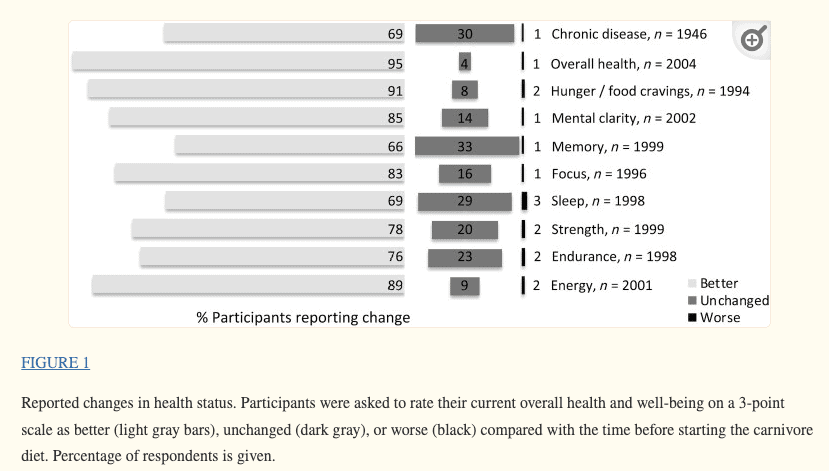
But, surprisingly, there are some people, specifically with Hashimoto’s thyroiditis, who have found significant relief using this diet.
Relief from these individuals has come in the way of improved weight loss and symptoms which may be indicative that their thyroid function has potentially improved (increased hair growth and so on).
This certainly doesn’t guarantee that the carnivore diet is helpful for Hashimoto’s thyroiditis specifically, but it does raise a few questions:
First, is this diet worth exploring if you have Hashimoto’s thyroiditis?
Second, if it is working, how does it work?
Third, if it is effective, what can we learn from this diet?
And fourth, is this type of diet safe?
How Does it Work?
It’s not actually clear how this diet works, but there’s no denying that some people on the diet are finding significant relief.
But this begs the question:
How does it work?
I’m not 100% sure (I don’t think anyone is), but if I had to guess then I would suspect that the major mechanism by which this diet produces significant results has to do with how it influences your intestinal tract and the gut microbiome.
It’s well known that the locus for the development of Hashimoto’s (and other autoimmune diseases) likely starts in the gut (2).
A disordered gut microbiome (changes to the bacterial concentration in your gut) can precipitate damage to your intestinal lining which may result in ‘leakage’ of bacterial products into the bloodstream.
These products can then trigger an immune reaction and result in autoantibody production through a process known as molecular mimicry.
Beyond this, we also know that inflammation in the gut can interfere with immune signaling, alter neurotransmitter levels, allow inflammatory products to enter the bloodstream, and so on.
With all of this in mind, if it were possible to target and fix many of these issues, would it help your autoimmune condition?
The answer is probably yes, at least for the majority of you reading this and perhaps that is how the carnivore diet is helping.
You’re also necessarily cutting out the bad portions of the Standard American Diet including wheat, soy, gluten, and processed foods.
The carnivore diet happens to fit all of the following criteria:
- Low FODMAPs (3)
- Low Oxalate (4)
- Low Lectin (5)
- Low Sulphite (6)
- Low Carbohydrate (7)
- Low Salicylate (8)
- Low Phytate
- Low/no fiber
In this way, the carnivore diet may be acting as the ultimate elimination diet for many people.
And we know that the elimination diet can have profound effects on the body (9), especially for certain individuals.
We also know that other diets which exclude these food groups have also been beneficial for those with Hashimoto’s including diets such as the AIP diet, strict paleo, the gluten-free diet, and so on.

It’s possible that the carnivore diet allows for the healing of the intestinal gut tract, normalizes hormones such as insulin, the balancing of bacterial species in your gut, and the reduction in inflammation or immune regulation systemically.
This may be achieved through a process that mimics the fasted state simply because it alters where food is being digested in the intestinal tract.
All of this is hypothetical, however, because it hasn’t been well studied, but I’m speculating that it may work through these mechanisms.
Long-Term Safety
Before you start this diet you should be aware that there are no long-term studies that show that this diet is safe or effective long-term.
This doesn’t mean that you shouldn’t use it, but it does mean that you should proceed with caution.
It would be less than ideal to find out that you are one of the people experimenting with their bodies only to find that this diet is associated with long-term issues down the road.
As I mentioned previously, just because the carnivore diet may have a positive benefit on your immune system does not mean that it has a positive effect on other systems in your body.
Among those which may be compromised includes your cholesterol system and the absorption of certain nutrients.
While the connection between dietary saturated fat and heart disease has been contested over a long period of time, it’s probably not a good idea to personally test this data and consume massive amounts of dietary saturated fats.
Some meta-analyses (10) conclude that dietary fat is potentially harmful to your body as it may lead to an increased risk of heart disease and/or stroke.
So, while this diet may be helpful for your immune function, are you willing to trade the potential risk of cardiovascular disease for a reduction in your symptoms?
Some of you might answer yes, and that’s a personal decision you might have to make.
Also, it’s worth pointing out that utilizing the carnivore diet temporarily may allow you to reduce gut inflammation, and promote healing in the intestinal tract, which may allow you to transition to a different type of diet that is more balanced.
If you are using the diet in this way then you may be able to mitigate any long-term safety issues.
Finally, another issue worth considering is that of nutrient absorption.
Consuming a diet that is 98%+ in meats is likely to be low in certain vitamins, including vitamin C, vitamin D, iodine, magnesium, and potentially many others (11).
Theoretically, this may lead to a deficiency in these nutrients which may result in unwanted negative symptoms.
This problem can easily be overcome, however, with the use of a multivitamin or other supplementation.
If you opt to use this diet, just remember that you should ensure that you either supplement or ensure that you also are consuming nutrient-dense portions of meat such as organ meats which are incredibly nutrient dense (12).
Meat and Hashimoto’s
If you’ve been reading my blog you know that I’ve previously discussed something called Neu 5 Gc.
Neu 5 Gc is a product found only in animals and some studies have shown that it may be associated with Hashimoto’s (the exact mechanism isn’t clear but you can read more about it here).
If Neu 5 Gc may be bad for Hashimoto’s and it’s primarily found in red meat and animal products then how can the carnivore diet be good?
Well, for many reasons.
#1. The connection between Neu 5 Gc antibodies and Hashimoto’s is still not well understood.
So, even though there is a connection between the two it doesn’t mean that one causes the other or vice versa.
#2. Assuming there is a negative connection, it’s also possible that other factors are still involved which play a greater role in the development of Hashimoto’s.
So, with this logic, even if meat may be bad for your immune function, it’s possible that the elimination diet and its benefit on your body are greater than the negative impact that meat may have.
In this way, you are basically choosing the lesser of two evils.
#3. Neu 5 Gc antibodies do not equally affect all individuals.
Due to a variety of conditions, including genetics, it’s possible (and certainly probable) that even if red meats negatively impact some people, there will always be others who thrive on them.
It’s best to try to avoid reductionist thinking, especially as it relates to diet, as it may force you into a line of thinking which is inaccurate and unhelpful.
Bottom line?
Even if red meats are bad for some people doesn’t mean they are bad for all people.
The Dangers of Low-Carbohydrate Diets on Thyroid Function
This might make some people upset but it may be helpful to think of the carnivore diet as a more restricted version of the ketogenic diet.
I know the diets aren’t the exact same but for purposes of evaluating potential harm, lumping them together can be helpful.
This is because both diets, at their core, don’t allow for any meaningful intake of carbohydrates.
This means that much of the potential harm that comes from the ketogenic diet, as it relates to your thyroid, can be passed on to the carnivore diet as well.
And, as I have discussed in previous articles, there are definitely some potential downsides to the ketogenic diet when it comes to thyroid function.
It’s well known that decreasing carbohydrate intake absolutely has an impact on T3 levels.
The lower your carbs, the lower your T3 will go (13).
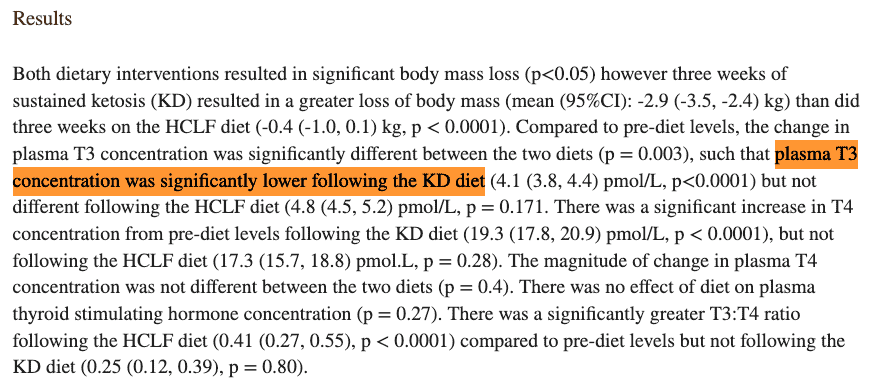
Some people believe that this is a compensatory mechanism and may provide benefits for lifespan, but from the perspective of thyroid patients, even if it can provide benefit to some, that benefit doesn’t extend to people who already have low T3 levels (like many of you reading this).
As a result, low carbohydrate diets are often not ideal for people suffering from low T3 syndrome, euthyroid sick syndrome, or those who are drifting on the edge of hypothyroidism even while taking thyroid medication.
Using low carbohydrate diets in any of these settings may be enough to push you into full-blown hypothyroidism or simply make your existing thyroid function worse.
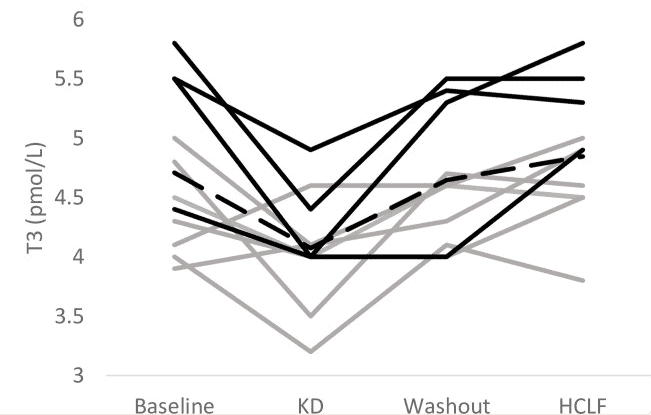
Does this mean you should avoid it? Not necessarily.
As with anything in medicine, you have to take the good with the bad.
In this case, the carnivore diet has the potential to help improve thyroid function by reducing immune damage to the thyroid gland.
But how do you weigh the net effects of something that has the potential to cause both benefits as well as harm?
This is where things get tricky and why it’s always helpful to have something in your corner willing to help you make sense of the noise.
There’s also the argument that losing weight, which the carnivore diet can help with, will positively impact your thyroid.
On the other hand, how are you supposed to lose weight when you are doing something which lowers your T3 level which is one of the primary regulators of your metabolism?
I don’t have an answer for you, at least not one that you’ll like, but these sorts of questions firmly suggest to me that if the carnivore diet is going to be used, it should be used on a temporary and not long-term basis.
Should you Do it?
I am very sympathetic to those people who are suffering from chronic conditions, including Hashimoto’s, and who have been unable to find help.
I’m well aware of the limitations of the current medical system when it comes to taking care of those with chronic medical conditions, especially autoimmune conditions.
These individuals are often at their wit’s end and just need some relief and they are willing to do drastic things to find that relief.
If you fit into this category then perhaps the carnivore diet is something worth exploring.
But, if you proceed, be cautious and remember that this diet has not been studied long-term so there’s no way to know if it’s actually healthy or not for your body to be in this state.
In addition, because of the many unknowns about the long-term safety of this diet, it’s probably not a good idea to use it long-term.
It may be wiser to use it as a type of elimination diet which then allows you to transition to other foods.
You may also find success using it temporarily to allow for gut healing or a reduction in inflammation in your body.
Utilizing the carnivore diet in this way may allow for a reduction in some of the risks that we discussed previously.
If you are new to Hashimoto’s and you aren’t sure where to start then I would probably recommend that you avoid the carnivore diet.
Why?
Because there are plenty of other diets which include a variety of foods that are more researched and shown to be both safe and effective.
If, on the other hand, you are a Hashimoto’s veteran and have been unable to find help in any of these diets in the past, then it may be worth exploring the carnivore diet (but only for a limited time).
Final Thoughts
Unlike other diets that I’ve discussed in the past, this is one diet that I’ve never recommended to my patients nor have tried myself.
It doesn’t mean that I’m necessarily opposed to it, but I would like to see a lot more information and research about it before I get to that point.
But I would like to hear from you:
Have you tried the carnivore diet or are you currently using it now?
Did you find it to be helpful for your thyroid or Hashimoto’s?
How did it affect you?
Leave your questions or comments below so we can keep the conversation going. I’d love to know if any of you have tried it (or are thinking about trying it) and what your experience has been.
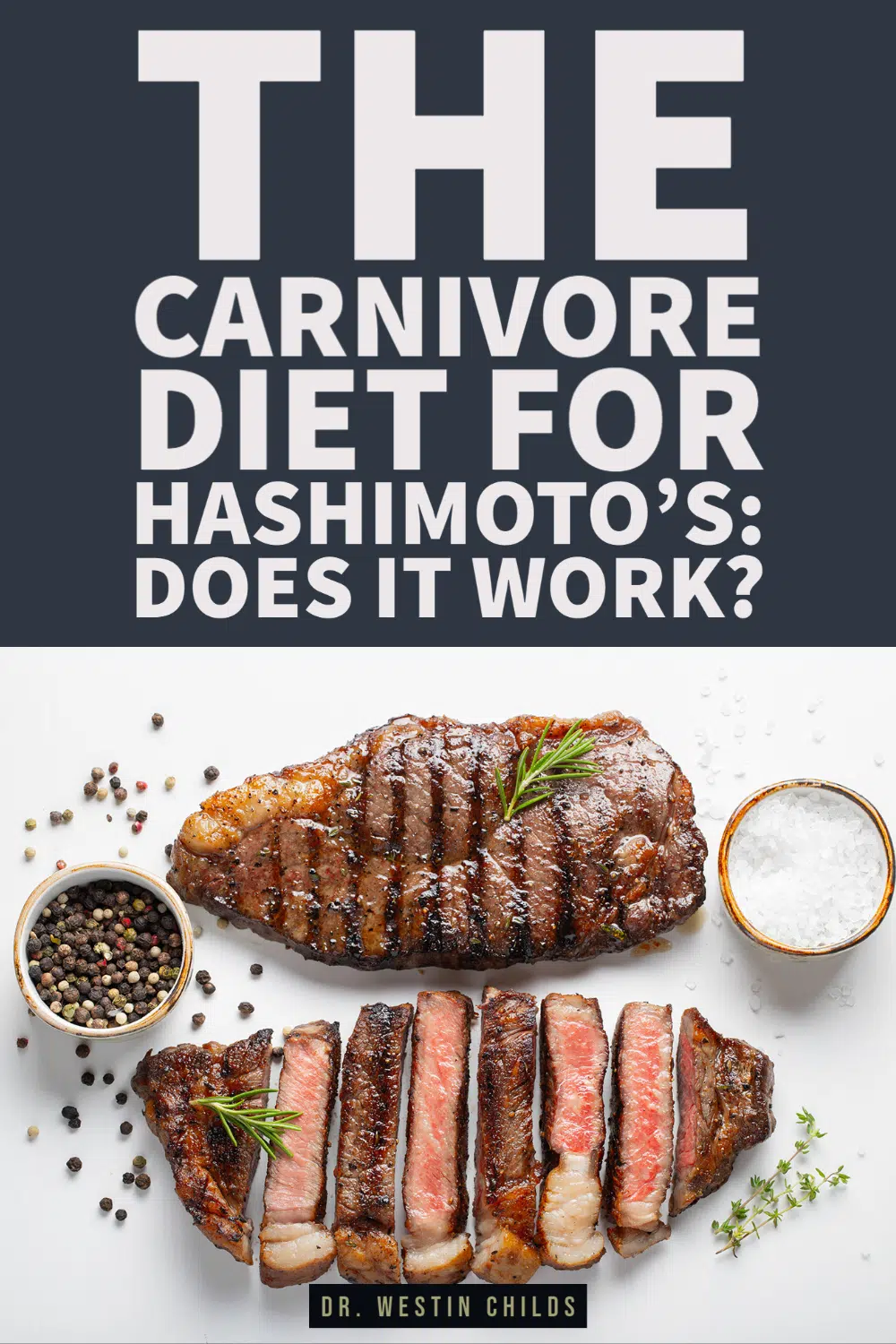
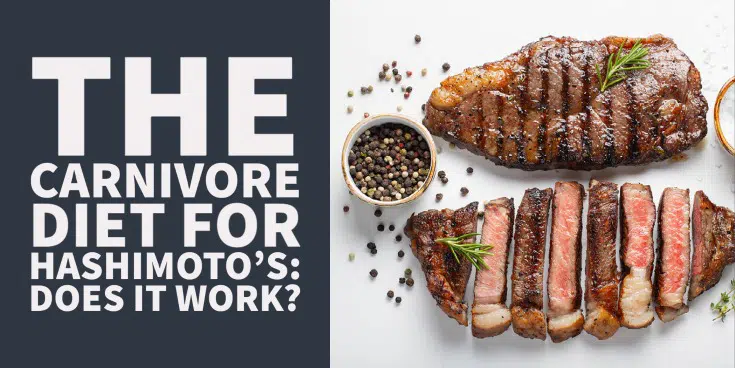

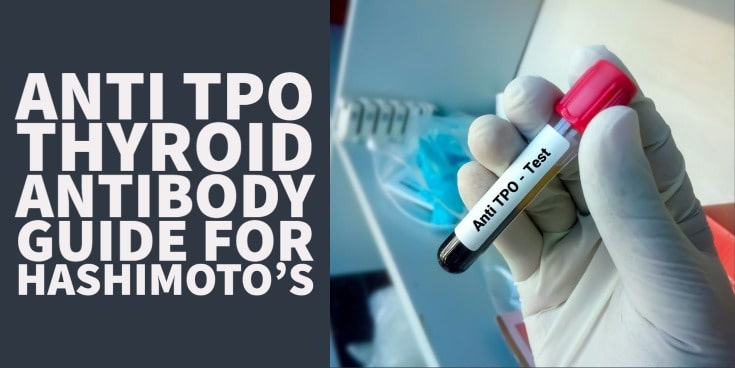
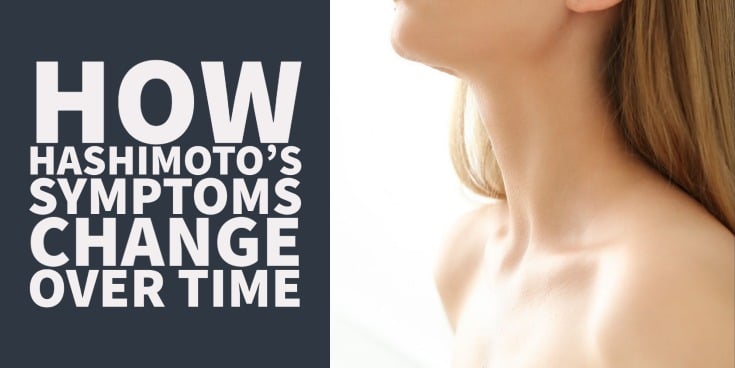
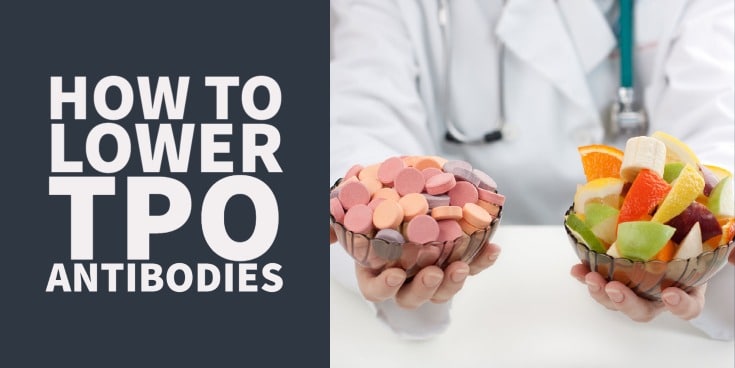
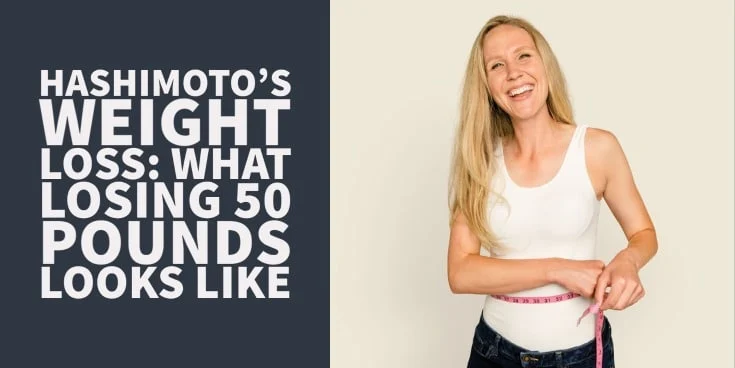


I have Hashimotos and all the thyroid problems that go with it. I have tried many diets that have failed me, but I am currently eating Keto which is mostly meat and cheese for me. I feel SO much better. I highly recommend.
Hi Lauren,
Thanks for sharing! I’ve explored keto and why I don’t frequently recommend it to thyroid patients in this article: https://www.restartmed.com/ketogenic-diet-thyroid/
I have antibodies for both Hashimoto’s thyroiditis and Graves Disease. I also have other autoimmune issues. Following a very strict Carnivore diet of grass fed and finished meat, organs and water for nearly 14 months now and have come off most medications except for NDT and bioidentical hormone replacement. My TPO antibodies dropped from nearly 900 to 31. My ferritin dropped from well over 1000 to 392. My CRP now normal after 5 years of being off the charts. My IBD is completely under control and my last flare ended 6 weeks into the diet which was unbelievable for me and it cut my Fibromyalgia pain by more then half. Having Celiacs, I have always struggled with nutritional deficiencies and now my nutritional profile is on point and my doctor is thrilled with that. I am still healing and struggle with the Hashimoto side of things but I am so happy with the improvements. I ate a very low carb high fat diet for years then switched over to very strict keto for a few years. Because my autoimmunity continued to attack so violently and food sensitivity was off the charts I decided to try Carnivore at my doctors encouragement. Best decision for my health ever.
Hi Lisa,
Thanks for sharing your experience! Glad it’s working for you.
Actually it is wrong about all the vitamins mentioned but especially vitamin D, a fat-soluble vitamin that works synergistically with A and K, and most abundantly bioavailable in animal products. Eskimos and some other people are carnivores so depending on ones genetics I believe this can be the ideal diet. Everyone needs to listen to their body
Hi Isabel,
While meats do contain some vitamin D as cholecalciferol, the primary source of vitamin D in humans is still sunlight and this will be true even for those on the carnivore diet. Eskimos could get away with less sunlight because they consumed primarily fish in their diet which is much higher in vitamin D compared to other meats.
If you eat the carnivore diet without a lot of fish, you’re still going to need to get in the sun for adequate vitamin D which is why my statement was included in this article.
This problem is easily solved by simply getting out in the sun for 20-30 minutes per day or by using an additional vitamin D3 supplement.
I have had Hashimoto’s for many years and struggled with ups and downs, changes in the meds, etc. However, I have always known that a low carb diet works best for me. I can’t go long without eating meat, mostly red meat (chicken doesn’t do the same thing for me). So it’s great to hear this recommendation and it just confirms the Adkin’s diet from years ago. He was the pioneer 🙂 I would add though that today we need to stick with grass-fed meats as much as possible.
Hi Carla,
I’m glad you found something that works for you! Just so I am clear, though, I am not necessarily recommending this diet, just offering potential theories as to why it may positively impact some people. I would certainly caution against using this diet, though, for the reasons stated in the article.
Yes you are correct, the nutrition in commercial animal products is not the same. However this diet is not going to be suitable for many. Pasteurized dairy is the worse but many people are intolerant so a traditional elimination diet where everything is removed save puréed carrots, meat broth and puréed meat, and a natural fruit juice gelatin (real beef gelatin) for 2-3 days and then add foods one at a time will achieve the best long term results for most people.
Unfortunately, this elimintation diet would not have worked for me, as carrots cause serious digestive issue for me. I discovered this when I was adding in some veggies to my carnivore diet base.
I am on the keto diet and have found great benefits to it. I can certainly tell when I have overdone the carbs with the pain in my joints. When I do eat carbs though it is usually raspberries/blackberry etc. I also include above ground veg. Do not eat gluten like bread/pastry and all my meals are cooked from scratch. Very pleased with the results especially keeping my weight under control.
Hi Sharon,
There’s definitely a certain type of person that tends to do well on the keto diet. It sounds like you might fit into that category. Thanks for sharing!
I have Hashimoto’s and have had a difficult time losing a small amount of weight (8 lbs). I’ve done some research and decided to try the carnivore diet. I made it 2 days before I experienced pretty significant stomach cramps and was extremely bloated. I decided to continue as long as I could thinking that my digestive system just needed to recalibrate. The stomach cramps were the negative along with having no BM’s for 3 days, (didn’t necessarily feel constipated just felt that I didn’t have to go) feeling nauseous and feeling that the thought of eating more meat physically made me feel sick each day. As the few days went on, I had no appetite and by the end of the 4 days had 1 meal and was not hungry. I was mentally clear and sharp and slept very sound plus I have low anxiety which completely disappeared at the end of day 1. Days 3 and 4 I experienced pretty gnawing stomach cramps and diarrhea and I decided to stop. Since then I have decided to review my nutrition and protein intake and gradually added back in veggies but am continuing to add more protein back into my diet.
Hi Christina,
Thanks for sharing your experience! It sounds like the complete diet didn’t work well for you but perhaps some variation would still benefit you.
Please give carnivore another try. I am hypo, lactose intolerant, low blood sugar ( was on insulin yrs ago when overweight) am f 68, have high histamine so have to eat meat fresh and no leftovers or I get very ill and itch everywhere, no bowel movements for a day or two and then very little is normal. Your body uses the meat for energy. It’s best to eat only raw butter…don’t drink milk..it’s sugar. Even get off coffee and tea if you can. No sweets even stevia. Don’t over cook meat= nausea. My fav so far are ribeye. Love them. One big one or one and a half keeps me full 24 hours. I did hurt the first day ..I have oxalates and they will fight to stay. Drink enough water. Take magnesium citrate in low doses , I take d3, k2 and magnesium, and a potassium supplement. You won’t need vit C if you eat organic or grass fed. Remember we get the vitamins the animals got so avoid corn fed animals. I’m going thru coffee withdrawals slowly and processed foods like chocolate, crave sweet potatoes but I’m also past menopause and after being on red meat 7 days I’m feeling my libido coming back. I’m also noticing my pants are loose. I’m having histamine still so giving all my cheese to hubby.
Go easy into the diet..cheat enough to stick with it for a mo. Then after that try straight grass fed red meat, free range egg yolks only,
( yolks are easily digestible) no milk, look up dr. Berry and ‘ steak and butter girl’ in YouTube.
As Vicki mentioned… please give Carnivore another try! It’s very normal to have diarrhea a few days into keto because of the combo of the die-off of bacteria that were feeding on the carbs you were eating plus the release of water that was bound to the glycogen you were storing but used up once you stopped eating carbs.
I agree. Since then I have added roughly 1/2 cup low carb veggies per day to my diet and that seems to have made a difference. This is truly bio individual!
I’ve had Hashi’s for over 3 years. Tried every diet. Did strict AIP for 2 of those years. Still had significant bloat, digestive distress, pain, fatigue, brain fog. My husband came across carnivore. I thought it was crazy and went against everything I’d ever learned ( I’m an oncology nurse and science nerd when it comes to nutrition). I’d also come across Izabella Wentz’s suggestion that if you’d tried everything, had no results and had breast implants, you might want to consider removing them. I’d made a dumb choice 15 years earlier and had saline implants (even they have 40+ heavy metals and toxins!). So I removed them last November. My TPO dropped from 227 to 66 about 2 months after removal. Carnivore has taken me to the next level of healing. ALL of my pain is gone, I have more energy and brain fog definitely improved. I’ve been doing carnivore for 10 months and have lost the 15-20 lbs I could NOT lose on vegetarian or vegan ( absolute worst I ever felt),Paleo, Keto, AIP. It just melted off over a few months. In regards to cholesterol, there’s a bunch of hype out there propagated by big pharma and MD’s that are still using old science. Yep, my cholesterol went up to 255. But, all my numbers are great. Over 50% of those having heart attacks have a normal or low cholesterol. It is not a high cholesterol that causes heart disease, it’s inflammation. Cut out sugar and processed foods, throw in some fasting and most will cut their cardiac risk substantially. Thanks for your work. It’s important.
Thank you, this helped me with my decision to try it!
OMG thank you, I also had breast implants and decided to remove them as they caused me to develop Hashimotos. Its been 3 years since but I can’t seem to lose the 20lbs I gained. I have tried everything, except this.
My thyroglobulin antibodies tested as being high (3.4 IU/mL) this January 2020 and my ferritin, iron and hemoglobin got low enough to give me shortness of breath and dizziness. My workplace cigarette smoke allergies were causing my nose to run and triggering a cough for several months. Not a good situation during the coronavirus craze and luckily no fever.
I did the Carnivore Challenge with The Drs Wolfson in January and again in the beginning of June. My rotator cuff pain disappeared and my shortness of breath mostly resolved itself. My serum iron rose but my ferritin stayed the same. My TgAb went down to less than half of what it was in the beginning of the year (1.2 IU/mL).
I found the Carnivore Challenge unpleasant and fell asleep in the middle of the day, taking unplanned naps twice a day for five days that I was on it. It felt like reduced T4 to T3 conversion, even with the T3 Conversion Booster. I ended the diet with the equivalent of Functional Fuel Detox protein powder, T3 Conversion Booster and Thytropin. After two weeks, I went for my thyroid lab tests, following Dr. Childs’ recommendations for optimal testing conditions – no biotin for a week, Day 7 of my menstrual cycle and no L-tyrosine. My Reverse T3 tested below 15 for the first time since 2011 while my free T4, free T3 and total T3 are in the low normal range. It’s probably because of the suboptimal iron.
Carnivore Diet is effective for Hashimoto’s but my body acts like I’m on the ProLon fasting mimicking diet while doing it. I plan to avoid it and take iron supplements until my antibodies and ferritin improve. I hope Dr Child’s continues these blogs so that thyroid patients can continue to take charge of our own health.
Can you please explain the difference in the impact of a keto diet versus carnivore diet? I’ve done both in the past. I’ve had Hashimoto’s for 23 years but haven’t been on any meds in over 6 months, as labs have come back normal lately. I need to lose some weight but I want to do it safety & not sabotage my thyroid(again) in the process. Thanks for all your good advice & information!
I have Hashimoto’s…and have never been a person that feels good, nor has it ever been easy for me to lose/keep weight off…even with lifting, fasted cardio and “eating clean”…My hair started thinning out in my late 20s, I’m in my late 30s now and prior to my carnivore experiment, I could see my scalp when my hair was pulled back. I’ve been eating carnivore with intermittent fasting for 42 days now, weight is literally melting off, my hair is growing back, my skin and nails look amazing, my depression is gone, and most of all I FEEL GREAT. I’m not bloated anymore, my GI system seems to work so much more efficiently than it ever has. I don’t have cravings, or feel like I’m really missing out on anything. I did notice in the first 2-3 weeks I had a lot less energy as my body was adjusting…but that has resolved itself and my workouts are where they used to be. I highly recommend giving this a try if you suffer from Hoshimoto’s. Literally the only symptom that hasn’t resolved itself is the cold feet.
Thank you Dr. Child’s for this article, I truly value your input. I have been researching the carnivore diet and this has been so helpful to me. I also appreciate those who responded with their experience. I noticed that mostly red meat was included on the carnivore food list. Is that the most effective option if one wanted to try it? Thanks again!
Hi Beth,
Most versions allow different (all) types of meats. What I mentioned here is really just an overview to introduce the idea, not necessarily to serve as a complete approved food list.
My 84-year old mother has been in remission from Graves disease for many years now. She has celiacs.
also. Three years ago, out of pure desperation, she ate nothing but organic meat. Stopped eating everything else. She couldn’t determine what foods were causing her severe sensitivities and allergic reactions so she simply started eating meat out of desperation. My pioneer mom never heard of this diet. She simply made it up herself because she felt so badly. Fast forward three years later, aside from remaining gluten free, now she can eat pretty much anything within a healthy whole foods/Paleo diet and her overall health, weight etc. is great. She is on no meds except one for blood pressure. She wasn’t under a doctor’s supervision at the time so I might recommend if anyone do this, definitely check with your doctor and take the appropriate supplements. At her age, my mother became somewhat jaundice- her skin and eyes were a bit yellow. She didn’t look good, but I suspect this gave her gut a break so she could reintroduce other foods back into her diet.
I have a brand new diagnosis of Hashimoto’s myself along with an insane amount of brand new food allergies and sensitivities. Not sure this is a diet for me as I’m highly sensitive to casein, eggs, and beef. But I can tell you eating fish, chicken, and turkey make me feel so good. All other foods make me feel hungover and sluggish with a headache.
Hi Elaine,
Thanks for sharing! With some trial and error, you should be able to figure out which whole foods work best for your body. There’s probably also something to the idea of giving your gut a rest, but this doesn’t have to be done with the carnivore diet, it could be done with fasting as well.
Dairy free, egg free, gluten free, avoid sugars, & eat a well balanced diet which includes meats, vegetables, fruits, g/f bread, & after dinner one piece of 70% dark chocolate. Even drink coffee & tea! Use supplements of magnesium, selenium, vit D as well as Levothyroxine, daily gentle exercise workout. While I tire towards late afternoon I’m content to plan each day accordingly. Yet it’s been a l-o-n-g journey. I’ve found the daily exercise is a tremendous help for whole person.
Hi Cimmies,
Thanks for sharing and glad you found what works for you!
You must have me mixed me up with someone else. My question had nothing to do with diet. My question was, “Does Dr. Childs have an additional or separate vitamin/mineral supplement for Hashimoto’s or does he have just ONE vitamin/mineral supplement for BOTH low thyroid and Hashimoto’s?
Hi Billie,
I have several supplements that can be used for both Hashimoto’s and hypothyroidism. If you are looking to use just one then I would take a look at this: https://www.restartmed.com/product/thyroid-daily-essentials-thyroid-multivitamin/
The more you use the better, though, which is why I created this Hashimoto’s bundle: https://www.restartmed.com/product/hashimotos-bundle/
I have a hypothyroid disorder… more of a conversion issue of T4 to T3 and am transitioning to carnivore now. I am in ketosis (for the past 3 weeks, and I feel great) but haven’t let go of all the plants yet… namely keto chocolate. lol And I’m about to bite the bullet and start tapering off my liothyronine. I’ll have to report back in a few months.
Thank you for bringing attention to the carnivore diet through your platform, Dr. Westin. If you (and I mean the plural, like “y’all”, which we say here in the South 🙂 research The Paleolithic Ketogenic Diet (PKD, not to be confused with Polycystic Kidney Disease) based out of a research facility and clinic, Paleomedicina in the country of Hungary, you can find at least 18 of their published medical papers since 2013, on CURING individuals with various cancers and autoimmune disorders with this diet. It is essentially the strictest form of the carnivore diet… only 4-legged mammals (although they give allowances for some plants, fish, poultry and eggs if your issue is not as severe/difficult, such as non-autoimmune thyroid issues.) They give details (in an inexpensive report) of the fat to protein ratios and of course to eat grass-fed/wild-caught, etc. And now with a growing focus on regenerative/restorative agriculture/farming, you can find animal products that actually IMPROVE the environment. Buh-bye Big Ag!!
The fossil record (of feces) shows our prehistoric ancestors between 50,000 and 300,000 years ago ate ZERO plant matter. And we became who we are today (large brain and all) during that early time period thanks to all the animal fat we ate off of woolly mammoths, mastodons, giant ground sloths, etc. Here is a quote from their paper: “…currently living humans still have a physiologic makeup optimized for Ice Age conditions”, which they point out humans lived in for 2.6 million years.
These neurobiologists and physicians have also demonstrated, after helping heal thousands of individuals with this diet, there are no human metabolic types and we are all equally suited to spend our entire lives in ketosis. This is the natural way for our body and cells to function. The key to PKD is eating the FAT for energy, a moderate amount of muscle (meat) for protein and ORGANS for all the nutrients you need, yes, even vitamin C. (I won’t get all in the weeds on this, but you don’t need as much vitamin C, when you’re not eating plants.) And no, you do not need to eat plants to be healthy, period. In fact, most plants hinder your health for all the above reasons/”criteria” that Dr. Westin lists. I’ve seen some recent interviews and blogs, including with a Cardiologist, debunking the idea that a carnivore way of eating leads to heart disease or cancer. In fact, it’s quite the opposite. Like I said, I highly recommend everyone looks into it.
Hi Stefanie,
The problem is that most dietary research is pretty weak. It’s just too difficult to get accurate information short of putting someone in a metabolic ward to monitor every single thing that they eat for years at a time. Researchers will argue until they are blue in the face that this diet is better or that that diet is better but at the end of the day, no one knows. I have no pony in the race, I’m just a bystander watching what’s happening and providing information.
One thing I can say for sure, though, is that not all diets work equally well for each person. You might find that carnivore works for you, but it also might be the case that it makes your thyroid considerably worse over the next few months. It will take some trial and error to figure it out.
Nothing could make thyroid function worse more than bloating and inflammation from all the food allergies we have, that’s why most of us only eat meat. I have two options at this point, and I’ve tried everything: a. Eat meat, which makes me feel great, no bloating or depression, or include other foods and be bloated, depressed, anxious, skin issues, mood changes, weight changes, the list goes on! So logically, eating meat makes the most sense! Why would anyone in their right mind go – “this is working, but it’s too good, I just feel too good, let me go back to being bloated and miserable!” Absolutely no one! I believe in eating 100% grass-fed / finished beef, pasture raised pork & chicken, chicken/beef liver, beef heart, etc. I don’t like fish, so I don’t eat it, maybe one day I will. I do take vit D3, k2, and magnesium, plus some other great supplements for longevity. I do think that you provide great information, but this article was a bit, too, you know.. fear mongering. It’s good you remain open minded though… it works for many of us, I would not be doing it if I didn’t have to! I’d still eat meat but I’d also love to eat an organic cassava cookie, using organic cassava flour / coconut flour, & organic maple syrup, organic coconut oil, plus vanilla, and dark chocolate chips, but I can’t, unfortunately. But that will be my treat in the future.
Haha! It’s late at night… You can correct the 2 references to “Dr. Childs.” 🙂